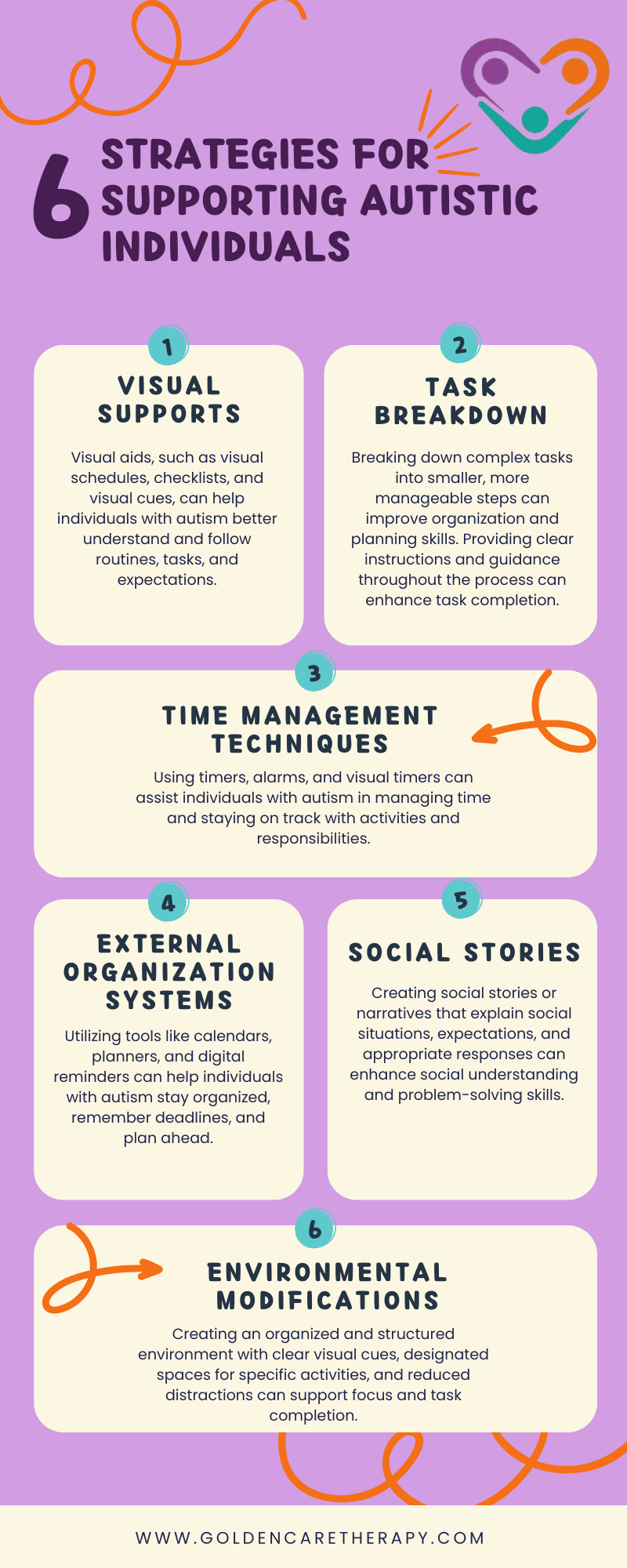Executive function refers to a set of cognitive processes that help individuals plan, organize, and execute tasks. For individuals with autism, executive function difficulties are common and can significantly impact daily functioning.
Understanding executive function in autism is essential for parents and caregivers in order to provide appropriate support and interventions.
In this article, we’ll have an overview of executive function and take a look at some of its most common examples.
What is Executive Function?
Executive function encompasses essential areas of daily living such as planning, problem-solving, time management, and self-regulation. It involves skills like organizing thoughts, initiating tasks, focusing attention, and adapting to changes. These skills are crucial for individuals with autism as they navigate various environments and routines.
Many people with autism struggle with executive functioning, which can manifest as challenges in organizing thoughts and actions to determine the sequence of steps needed for a task.
Temple Grandin, a prominent individual with autism, has expressed difficulties with complex thinking that requires holding multiple thoughts simultaneously. These challenges can impact academic performance, social interactions, and overall independence.
Individuals with autism face various challenges related to executive function. Some common difficulties include:
- Planning and Organization: Difficulty in creating and following a plan, organizing tasks, and breaking them down into manageable steps.
- Time Management: Struggles with estimating and managing time, prioritizing tasks, and meeting deadlines.
- Self-regulation: Difficulty in managing emotions, impulses, and self-control in different situations.
- Flexibility: Resistance to changes in routines and difficulty adapting to new situations.
- Working Memory: Challenges in holding and manipulating information in the mind, which can affect learning and problem-solving.
These executive function challenges can significantly impact daily activities, both in the school and home environments. Understanding these difficulties is crucial for parents and caregivers to provide appropriate support, accommodations, and interventions that can help individuals with autism thrive in their daily lives.
Examples of Executive Functioning Challenges in Autism
Understanding executive functioning challenges in autism becomes clearer when looking at real-life scenarios. These examples illustrate how difficulties with executive functions can impact various aspects of daily life, from academic performance to social interactions.
Let’s delve into these examples in greater detail.
Task Sequencing and Planning
Imagine a student with autism who is assigned a science project at school. The project requires several steps: researching the topic, creating an outline, gathering materials, constructing the project, and finally presenting it to the class.
For many students with autism, each of these steps can be overwhelming. They might struggle with breaking down the project into manageable parts, leading to procrastination or incomplete tasks.
Time Management
Time management is a common challenge for individuals with autism. They might find it hard to estimate how long tasks will take, leading to issues with punctuality and completing assignments on time.

Cognitive Flexibility
Cognitive flexibility, or the ability to adapt to new situations and switch between tasks, can be particularly challenging. Changes in routine or unexpected events can be distressing for individuals with autism.
Emotional Regulation
Managing emotions can be particularly challenging, especially in stressful or unfamiliar situations. Individuals with autism may experience heightened emotional responses that are difficult to control.
Inhibitory Control
Inhibitory control, or the ability to suppress impulsive behaviors and stay focused, can be challenging for individuals with autism. This difficulty can affect social interactions and daily functioning.
Interventions and Support
Effective strategies and context-based approaches play a crucial role in promoting the overall well-being and success of autistic individuals. Understanding and addressing these challenges can significantly enhance their quality of life.
Implementing effective strategies tailored to the individual’s unique needs can greatly assist in managing executive function difficulties. Here are some strategies that have shown positive results in supporting individuals with autism:

Understanding that executive function difficulties may vary across different contexts, such as school and home environments, is crucial for effective intervention planning. The perceptions of informants, including parents and education professionals, might not always align.
Therefore, it is important to consider multiple perspectives and adapt strategies accordingly.
Education professionals may observe different executive function strengths and weaknesses compared to parents. For instance, education professionals may rate children and adolescents with autism higher in areas such as self-supervision, emotional control, initiative, and emotional regulation in the school environment.
This discrepancy highlights the significance of considering the specific context when designing interventions and support strategies.
Additionally, it is important to acknowledge potential sex-specific differences in executive function within the autism population. Females with autism may exhibit varying levels of self-supervision, planning and organization, and other executive function skills compared to males.
Understanding executive function in autism helps us see the world through a different lens. It’s like having a roadmap to navigate challenges and unlock strengths. By recognizing common examples, like difficulties with planning or staying organized, we can offer better support and create more inclusive environments.
Everyone has unique abilities and needs. What matters most is how we embrace and accommodate these differences to help individuals thrive. For personalized support and guidance, explore how our dedicated team at Golden Care Therapy can assist you. We offer comprehensive services at our ABA centers in New Jersey, New York, Georgia, and Indiana.
Contact us today to learn more about how we can help you or your loved one achieve their fullest potential.



